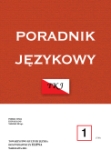Bezmyślny język. Zakłócenia zjawisk poznawczych u osób z autyzmem
A thoughtless language. Disruptions of cognitive phenomena in autistic people
Author(s): Andrzej KominekSubject(s): Psychology, Psycholinguistics, Cognitive linguistics, Western Slavic Languages
Published by: Dom Wydawniczy ELIPSA
Keywords: autism; theory of mind; idiolectal worldview; language functions; metaphor; metonymic cognitive style;
Summary/Abstract: In the presented paper, I am making an attempt to demonstrate the most important, in my opinion, characteristics of the language used by people with autism as ones arising directly from disrupted or completely different cognitive processes taking place in their minds. Such individuals lack, in the first place, the fundamental cognitive skill being the awareness of their own and other people’s mental acts. The absence or insufficiency of the theory of mind gives rise to disorders in acquiring the linguistic worldview, inability to decode figurative meanings, failure to use langue in order to maintain contact, and failure to speak of language itself, and many more. Autistic people are characterised by the metonymic cognitive style, which uses the potential of the so-called systemising skills. Instead of thinking of other people, what to say to them and what should be said to them, people with autism think of the things that do not require familiarity with the theory of mind and are not as complex as humans.
Journal: Poradnik Językowy
- Issue Year: 2021
- Issue No: 01
- Page Range: 7-23
- Page Count: 17
- Language: Polish
- Content File-PDF

